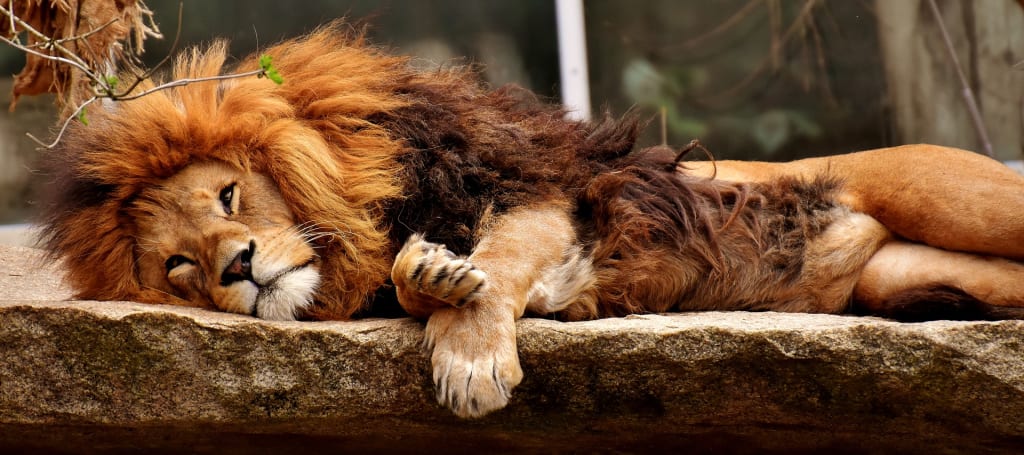What a Caged Lion Can Teach You About Freedom
Another way to look at the king of beasts

Lions are among the most popular zoo exhibits. As a child, I loved going to the zoo. I wanted to see these enormous creatures lounging in the sun. And sometimes I was lucky enough to hear one roar. It was exciting. They’re called the king of beasts for a reason.
Visiting a zoo’s lion enclosure is exciting for children and adults. But there are downsides for the lions.
Captive lions get free food, but they can’t hunt
In the wild, lions hunt for their food. They prey on zebras, wildebeest, and buffalo. They roam wide areas for their food and water, and they kill when they’re hungry.
But captive lions don’t hunt. Instead, they’re given a daily ration of beef. They don't have to exert themselves by hunting; all they have to do is wait for a human to feed them. Their predatory instincts are dulled because they are not needed. And if returned to the wild, they would not survive.
Caged lions get free healthcare, but they can’t care for themselves
Wild lions live in prides where they support one another. One benefit of their socialization is they heal faster than animals who live alone. They find strength in the company of other lions. If a lion gets injured, the other lions will provide protection and support while it heals.
But a caged lion doesn't have a pride. They’re housed in pairs, and they don’t have the support of fellow lions. If they get sick or injured, humans provide caged lions healthcare.
Zoo lions get free shelter, but they can’t roam
In their natural habitat, lions don’t live in dens. They roam over wide areas and sleep in the open under shady trees. They’ll spend their days near streams so they have a constant water source.
In zoos, lions live in cages and sleep in man-made caves. Instead of roaming freely over dozens of miles, they are forced to live in small habitats. They live their lives in an unchanging environment.
Caged lions are given everything, but they are not free
A zoo lion looks like a lion in the wild, but it doesn’t live like a wild lion. They have massive paws with sharp claws, but they don’t hunt. They roar, but they don’t have a territory to roam and protect. They have a massive mane that looks ferocious, but they have no enemies.
Caged lions live longer than wild lions, but they will never experience their full potential of being the king of beasts. Instead, they are a zoo exhibit where people, safe behind bars or glass barriers, point and ooh and ahh.
Wild lions are guaranteed nothing, but they are free
Wild lions roam their territory and fiercely protect it from their enemies. They hunt and feed when and where they want, and they spend lazy days resting and sleeping near a stream. And they sleep at night under trees. If injured, they rely on each other for food and protection while they heal.
Lions in the wild are depentent upon themselves and their pride to support them. They are the king of beasts.
---
Final thoughts
The lion's cage is one of the most popular zoo exhibits. Visitors watch these magnificent animals lay in the sun and eat food provided for them. If they are lucky, they’ll hear one roar.
But caged lions are not free. They live their lives behind bars like inmates with a life sentence and no possibility of parole. They endlessly pace back and forth as if longing to escape their confines. Once caged, they can never return to the wild. They lose their survival skills and become dependent upon humans.
What can a caged lion teach you about freedom?
When people, like lions, are guaranteed everything, they are no longer free.
---
What a Caged Lion Can Teach You About Freedom originally appeared on Medium
About the Creator
Dayton Parks
Inspiring writers and the world through Self Development






Comments
There are no comments for this story
Be the first to respond and start the conversation.